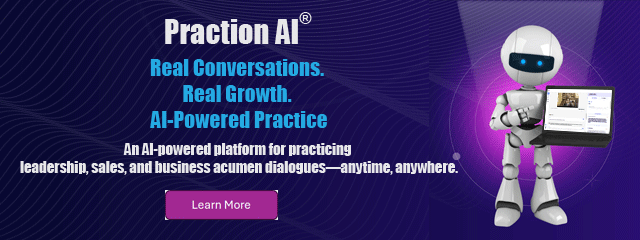It’s the new reality of work: global, hybrid teams spread across time zones, working together to achieve goals that ultimately drive their companies’ success.
achieve goals that ultimately drive their companies’ success.
I recently facilitated a virtual, global business acumen simulation workshop centered on critical thinking. One of the most interesting outcomes was a rich discussion about how AI is supporting the flow of work in hybrid environments and, more importantly, how it can help teams think more critically.
With great change comes great challenges. One of the biggest challenges facing leaders and organizations today is how to create a culture of critical business thinking. I define critical business thinking as the ability to analyze and evaluate information objectively, making sound decisions and solving problems effectively within a business context. It requires logic, reasoning, and the discipline to assess situations, identify solutions, and mitigate risks. This type of thinking is essential for navigating the complexities of today’s business world, fostering innovation, and achieving sustainable success that drives shareholder value.
As AI tools become more prevalent, their role in enabling and enhancing critical business thinking is becoming clear. Here are five ways AI can help hybrid, global teams sharpen this vital skill:
1) Enhancing Decision-Making Through Data Analysis
Hybrid teams often struggle to gather and synthesize data from multiple markets, time zones, and business units. AI-powered analytics platforms can consolidate this information, detect trends, and flag anomalies. Instead of getting lost in spreadsheets, teams can focus on the bigger questions: What does this data mean? What actions should we take? AI doesn’t replace human judgment; it sharpens it by delivering unbiased insights for more effective evaluation.
2) Improving Scenario Planning and Risk Assessment
AI-driven simulation and forecasting tools allow teams to model “what if” scenarios, such as changes in customer demand, supply chain disruptions, or regulatory shifts, and visualize the outcomes. These tools help teams think critically about risks and opportunities, debate trade-offs, and align on strategies that balance resilience and growth.
3) Streamlining Collaboration and Reducing Miscommunication
Global teams often lose momentum due to poor handoffs, unclear context, or language barriers. AI-enabled collaboration tools now offer smart scheduling, automatic meeting summaries, and real-time translation. These capabilities free up teams to focus on problem-solving and innovation, rather than chasing updates or clarifying miscommunications.
4) Stimulating Innovation and Creativity
Critical business thinking isn’t just about solving problems; it’s also about generating bold ideas. AI tools, such as generative design and brainstorming assistants, help hybrid teams overcome creative bottlenecks by quickly producing prototypes, alternative strategies, and fresh perspectives. While AI can’t replicate human ingenuity, it accelerates ideation, giving teams a broader range of ideas to evaluate and refine.
5) Supporting Continuous Learning and Skill Development
Critical thinking is a skill that requires constant practice. Adaptive learning platforms powered by AI can assess decision-making skills, deliver tailored micro-lessons, and simulate real-world challenges for hands-on learning. These tools help hybrid teams stay sharp, agile, and prepared for the rapidly evolving business landscape.
Summary and Implications
AI is not a replacement for critical thinking. It’s a catalyst. For leaders and hybrid teams, the real challenge is learning to use these tools as amplifiers, not crutches: to ask sharper questions, make better-informed decisions, and build cultures where critical business thinking thrives.
Organizations that strike this balance will be the ones best positioned to drive innovation, navigate uncertainty, and deliver sustainable results for both shareholders and stakeholders.




